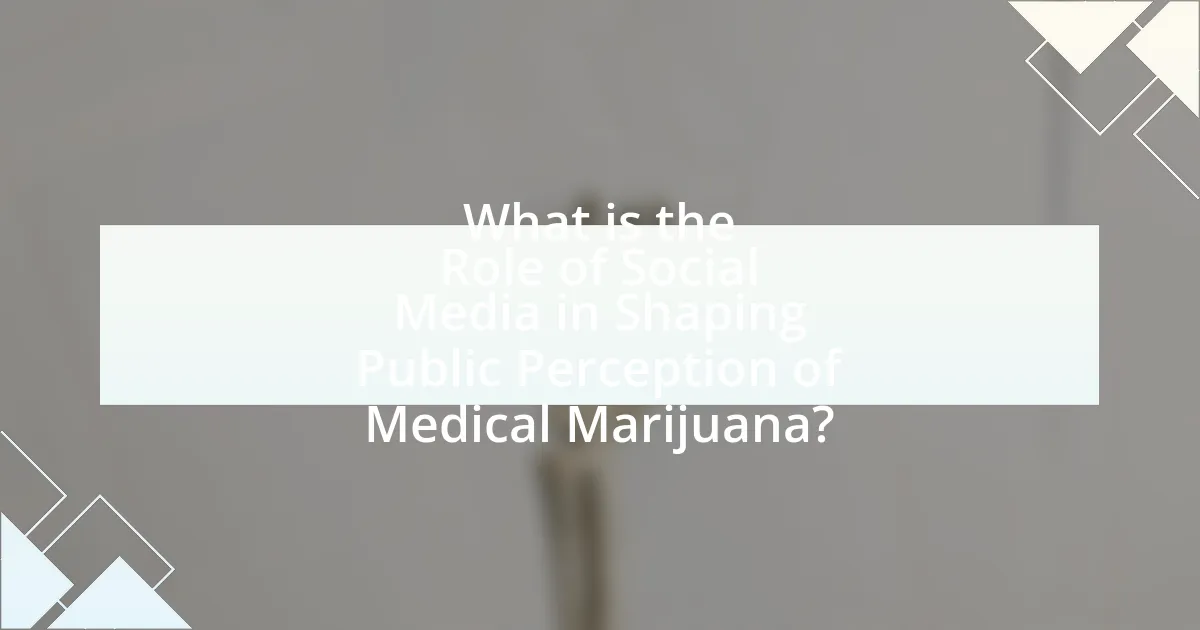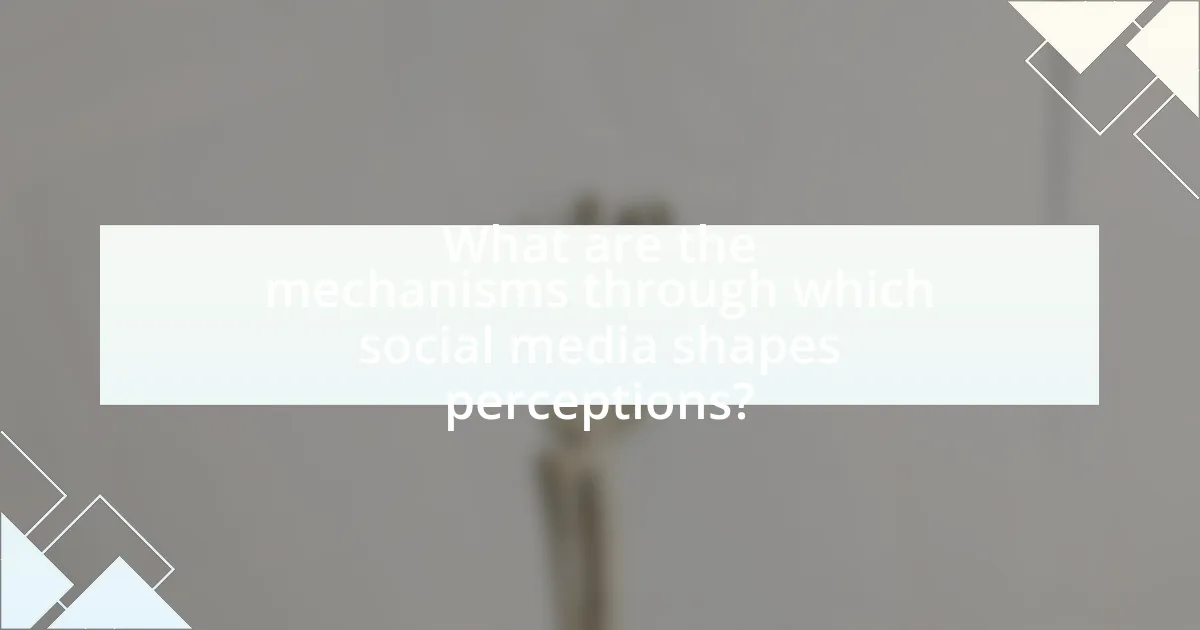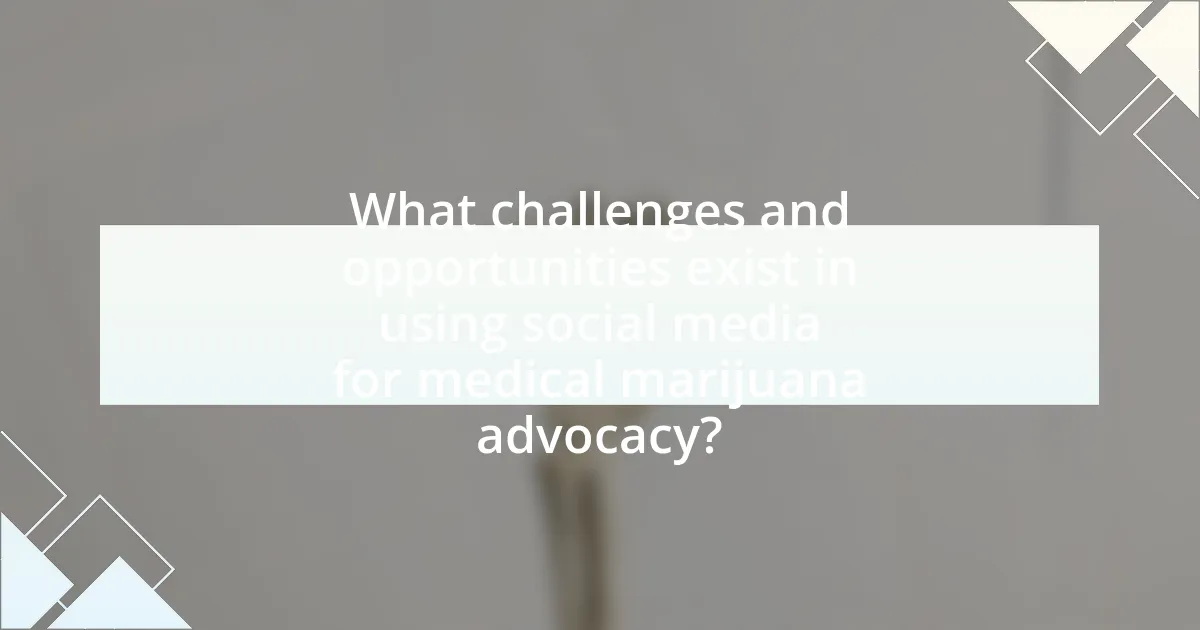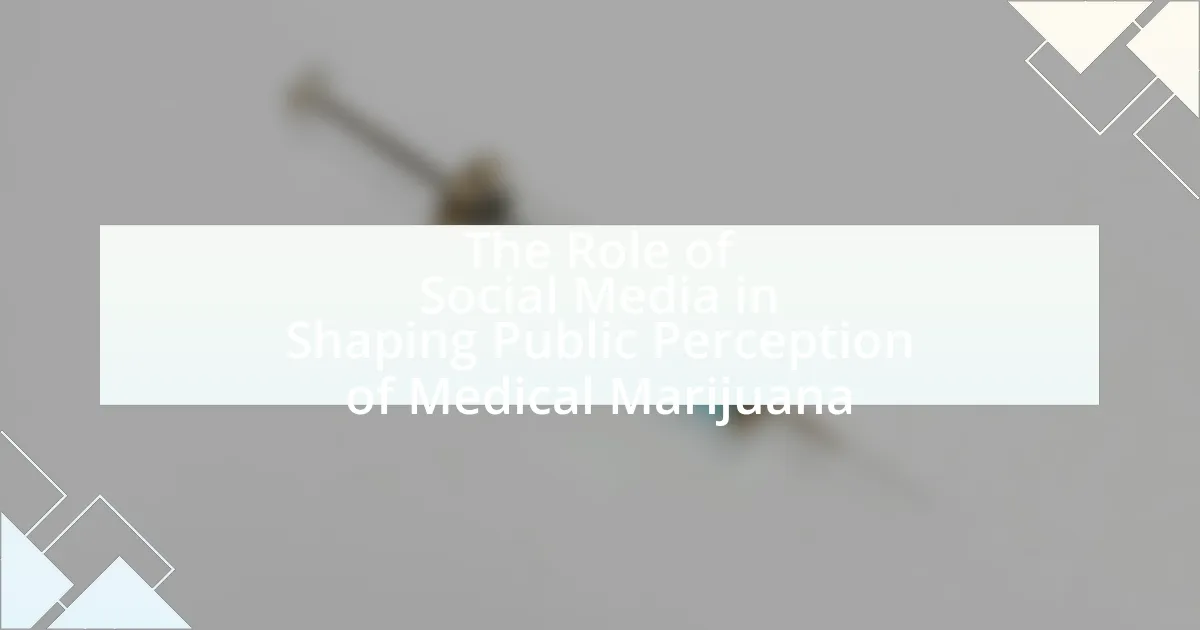The article examines the significant role of social media in shaping public perception of medical marijuana. It highlights how platforms such as Facebook, Twitter, and Instagram facilitate the sharing of information, personal experiences, and testimonials, which can influence attitudes towards legalization and medical use. The discussion includes the impact of user-generated content, the effectiveness of various types of posts, and the challenges posed by misinformation. Additionally, it explores how public perception affects legislation, medical professionals’ prescribing practices, and the overall advocacy landscape for medical marijuana.

What is the Role of Social Media in Shaping Public Perception of Medical Marijuana?
Social media plays a crucial role in shaping public perception of medical marijuana by facilitating the dissemination of information and personal experiences. Platforms like Facebook, Twitter, and Instagram allow users to share testimonials, research findings, and advocacy messages, which can influence attitudes and beliefs about medical marijuana. For instance, a study published in the Journal of Medical Internet Research found that social media discussions significantly impact public opinion, with positive narratives often leading to increased support for legalization and medical use. This influence is further amplified by the ability of social media to reach diverse audiences quickly, creating a space for dialogue and education that can challenge stigma and misinformation surrounding medical marijuana.
How has social media influenced public attitudes towards medical marijuana?
Social media has significantly influenced public attitudes towards medical marijuana by facilitating the dissemination of information and personal experiences. Platforms like Facebook, Twitter, and Instagram allow users to share testimonials and research findings, which can shift perceptions from skepticism to acceptance. For instance, a study published in the journal “Health Affairs” found that social media discussions about medical marijuana increased public support for legalization, with 60% of respondents indicating that they were more likely to support medical marijuana after engaging with related content online. This demonstrates that social media not only provides a space for dialogue but also actively shapes opinions and encourages a more favorable view of medical marijuana among the public.
What specific platforms are most impactful in shaping these perceptions?
The specific platforms most impactful in shaping perceptions of medical marijuana are Facebook, Instagram, Twitter, and YouTube. These platforms facilitate the sharing of personal stories, educational content, and community discussions, significantly influencing public opinion. For instance, a study published in the Journal of Medical Internet Research found that social media discussions on platforms like Facebook and Twitter can alter perceptions about medical marijuana’s efficacy and safety, highlighting the role of user-generated content in shaping attitudes.
How do user-generated content and testimonials affect public opinion?
User-generated content and testimonials significantly influence public opinion by providing relatable, authentic experiences that resonate with individuals. This type of content often serves as a powerful form of social proof, where potential users of medical marijuana are more likely to trust the experiences shared by their peers rather than traditional advertising. Research indicates that 79% of people say user-generated content highly impacts their purchasing decisions, highlighting its effectiveness in shaping perceptions. Furthermore, testimonials can humanize the medical marijuana experience, making it more accessible and less stigmatized, which can lead to increased acceptance and support for its use.
Why is public perception important in the context of medical marijuana?
Public perception is crucial in the context of medical marijuana because it influences policy decisions, funding for research, and the acceptance of medical marijuana as a legitimate treatment option. Positive public perception can lead to increased advocacy for legalization and support from healthcare professionals, while negative perceptions can hinder progress and perpetuate stigma. For instance, a 2021 survey by the Pew Research Center found that 91% of Americans support legalizing medical marijuana, indicating a significant shift in public opinion that can drive legislative changes and improve access for patients in need.
What are the implications of public perception on legislation and policy?
Public perception significantly influences legislation and policy, particularly in areas like medical marijuana. When the public views medical marijuana positively, it can lead to increased political support for legalization and regulatory frameworks. For instance, a 2018 Gallup poll indicated that 66% of Americans supported legalizing marijuana, which has prompted numerous states to enact laws permitting its medical use. Conversely, negative public perception can hinder legislative progress, as seen in states where opposition remains strong, resulting in stalled or rejected bills. Thus, public sentiment directly shapes the legislative landscape by affecting policymakers’ decisions and priorities.
How does public perception influence medical professionals’ attitudes towards prescribing medical marijuana?
Public perception significantly influences medical professionals’ attitudes towards prescribing medical marijuana by shaping their understanding of its efficacy and safety. When the general public expresses positive views on medical marijuana, often amplified by social media discussions and testimonials, healthcare providers may feel more inclined to consider it as a viable treatment option. Research indicates that as public support for medical marijuana increases, physicians report a greater willingness to prescribe it; for instance, a study published in the Journal of Pain Research found that 76% of surveyed physicians believed that public opinion affected their prescribing practices. This correlation highlights how social media can amplify public discourse, ultimately impacting medical professionals’ decisions regarding medical marijuana prescriptions.

What are the mechanisms through which social media shapes perceptions?
Social media shapes perceptions through mechanisms such as information dissemination, social influence, and community engagement. Information dissemination occurs as users share content, which can include articles, videos, and personal experiences related to medical marijuana, thereby influencing public understanding and attitudes. Social influence is evident when individuals observe the opinions and behaviors of their peers, leading to shifts in their own beliefs about medical marijuana based on popular sentiment or endorsements from influencers. Community engagement fosters discussions and support networks, allowing users to connect with others who share similar views or experiences, further reinforcing their perceptions. Research indicates that social media can significantly impact public opinion; for instance, a study published in the Journal of Medical Internet Research found that social media discussions about medical marijuana can lead to increased acceptance and advocacy for its use.
How do algorithms and content curation affect the visibility of medical marijuana discussions?
Algorithms and content curation significantly influence the visibility of medical marijuana discussions by determining which content is prioritized and shown to users. Social media platforms utilize algorithms that analyze user behavior, engagement metrics, and preferences to curate content, often favoring posts that generate higher interaction rates. For instance, a study by the Pew Research Center found that 64% of Americans believe social media has a significant impact on public opinion, indicating that curated content can shape perceptions about medical marijuana. Consequently, discussions that align with trending topics or receive more engagement are more likely to be visible, while less popular or controversial discussions may be suppressed, affecting public awareness and understanding of medical marijuana issues.
What role do influencers play in shaping narratives around medical marijuana?
Influencers play a significant role in shaping narratives around medical marijuana by leveraging their platforms to disseminate information, personal experiences, and advocacy. They often share testimonials about the benefits of medical marijuana, which can help normalize its use and influence public perception positively. For instance, studies have shown that social media influencers can effectively alter attitudes toward medical marijuana, as their followers often trust their opinions and experiences more than traditional media sources. This trust can lead to increased acceptance and understanding of medical marijuana, contributing to broader societal changes regarding its legalization and use.
How does the spread of misinformation on social media impact public perception?
The spread of misinformation on social media significantly distorts public perception by creating confusion and fostering distrust in credible sources. Research indicates that exposure to false information can lead individuals to form inaccurate beliefs about medical marijuana, impacting their attitudes and decisions regarding its use. For instance, a study published in the journal “Health Communication” found that misinformation about the efficacy and safety of medical marijuana can lead to increased skepticism among patients and healthcare providers, ultimately affecting treatment choices and public health policies.
What types of content are most effective in shaping perceptions of medical marijuana?
Informative articles, personal testimonials, and visual content such as infographics are the most effective types of content in shaping perceptions of medical marijuana. Informative articles provide evidence-based information about the benefits and risks associated with medical marijuana, helping to educate the public. Personal testimonials from patients who have experienced positive outcomes can humanize the issue and create emotional connections, influencing public opinion. Visual content, like infographics, simplifies complex information and makes it more accessible, which can enhance understanding and retention. Research indicates that social media platforms amplify these types of content, leading to increased engagement and sharing, which further shapes public perceptions.
How do educational posts compare to personal stories in influencing public opinion?
Educational posts generally provide factual information and data that can enhance understanding and awareness about medical marijuana, while personal stories evoke emotional responses and relatability, which can significantly sway public opinion. Research indicates that educational content can effectively inform and educate the audience, leading to more informed opinions; for instance, a study published in the Journal of Medical Internet Research found that educational posts increased knowledge and positive attitudes towards medical marijuana among readers. Conversely, personal stories create a narrative that resonates on an emotional level, often leading to stronger engagement and persuasion, as evidenced by a study in Health Communication that highlighted how personal narratives can lead to increased empathy and support for medical marijuana initiatives. Thus, both educational posts and personal stories play distinct yet complementary roles in shaping public opinion on medical marijuana.
What is the impact of visual content versus textual content on audience engagement?
Visual content significantly enhances audience engagement compared to textual content. Studies indicate that posts with images or videos receive 94% more views than those without, as visual stimuli capture attention more effectively. For instance, a report by HubSpot found that content with relevant images gets 94% more total views than content without images, demonstrating the strong correlation between visual elements and user interaction. Additionally, social media platforms prioritize visual content in their algorithms, further amplifying its reach and engagement potential.

What challenges and opportunities exist in using social media for medical marijuana advocacy?
Using social media for medical marijuana advocacy presents both challenges and opportunities. Challenges include misinformation and stigma, as social media can amplify false narratives about medical marijuana, leading to public confusion and resistance. For instance, a study published in the Journal of Medical Internet Research found that misinformation about cannabis can significantly influence public perception and policy decisions. On the other hand, opportunities arise from the ability to reach a wide audience and foster community support. Social media platforms enable advocates to share personal stories and research, which can humanize the issue and promote understanding. According to a report by the Pew Research Center, 69% of adults in the U.S. use social media, providing a vast network for advocacy efforts.
What are the potential risks of relying on social media for information about medical marijuana?
Relying on social media for information about medical marijuana poses several potential risks, including the dissemination of misinformation, lack of regulatory oversight, and the influence of anecdotal evidence over scientific research. Misinformation can lead to misconceptions about the efficacy and safety of medical marijuana, as social media platforms often prioritize engagement over accuracy, resulting in the spread of unverified claims. Additionally, the absence of regulatory oversight means that users may encounter biased or misleading content without the necessary context or disclaimers, which can skew public understanding. Furthermore, anecdotal evidence shared on social media can overshadow rigorous scientific studies, leading individuals to make health decisions based on personal stories rather than evidence-based information. These factors collectively contribute to a distorted perception of medical marijuana, potentially impacting patient choices and public health outcomes.
How can advocates combat misinformation and promote accurate information?
Advocates can combat misinformation and promote accurate information by actively engaging in fact-checking and disseminating verified data through credible channels. For instance, organizations like the American Medical Association provide evidence-based guidelines and research on medical marijuana, which advocates can share on social media platforms to counter false claims. Additionally, advocates can collaborate with healthcare professionals to create informative content that addresses common misconceptions, thereby enhancing public understanding. Research indicates that accurate information shared through trusted sources significantly reduces the spread of misinformation, as seen in studies conducted by the Pew Research Center, which highlight the effectiveness of educational campaigns in improving public knowledge.
What strategies can be employed to enhance positive engagement on social media platforms?
To enhance positive engagement on social media platforms, organizations should focus on creating authentic content that resonates with their audience. Authentic content fosters trust and encourages interaction, leading to higher engagement rates. For instance, a study by the Pew Research Center found that 64% of users feel more connected to brands that share genuine stories and experiences. Additionally, utilizing interactive features such as polls, Q&A sessions, and live videos can significantly boost engagement, as these formats invite direct participation from users. Engaging with followers through timely responses and personalized communication also strengthens relationships, as evidenced by research from Sprout Social, which indicates that 70% of consumers are more likely to recommend a brand that responds to their inquiries.
What best practices should be followed for effective social media advocacy regarding medical marijuana?
Effective social media advocacy regarding medical marijuana should prioritize accurate information dissemination, community engagement, and compliance with legal regulations. Accurate information is crucial; studies show that misinformation can lead to public skepticism and hinder acceptance. Engaging with the community fosters trust and encourages dialogue, as evidenced by campaigns that successfully mobilized support through interactive content and personal stories. Compliance with legal regulations ensures that advocacy efforts are credible and responsible, as failure to adhere to guidelines can result in penalties and damage to reputation.
How can organizations measure the impact of their social media campaigns on public perception?
Organizations can measure the impact of their social media campaigns on public perception by analyzing engagement metrics, sentiment analysis, and surveys. Engagement metrics, such as likes, shares, and comments, provide quantitative data on how audiences interact with content, indicating levels of interest and approval. Sentiment analysis tools can assess the emotional tone of social media conversations, revealing whether public sentiment is positive, negative, or neutral regarding medical marijuana. Additionally, conducting surveys before and after campaigns can directly gauge changes in public perception, providing qualitative insights into how attitudes may have shifted. For instance, a study by the Pew Research Center found that 62% of Americans support legalizing marijuana, highlighting the potential for social media campaigns to influence and reflect changing public opinions.
What are the key elements of a successful social media strategy for medical marijuana advocacy?
A successful social media strategy for medical marijuana advocacy includes clear messaging, audience engagement, educational content, and compliance with regulations. Clear messaging ensures that the advocacy goals are communicated effectively, while audience engagement fosters community support and interaction. Educational content provides valuable information about medical marijuana benefits and usage, which can help dispel myths and inform the public. Compliance with regulations is crucial to avoid legal issues and maintain credibility. For instance, a study by the Journal of Medical Internet Research found that educational campaigns on social media significantly increased public knowledge and acceptance of medical marijuana.

Leave a Reply